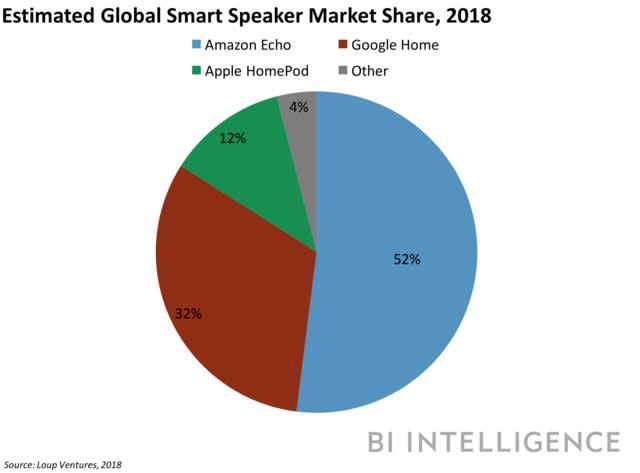Here's why a cheaper HomePod won't help Apple take down the Echo (AAPL, AMZN)

BI Intelligence
This story was delivered to BI Intelligence IoT Briefing subscribers hours before it appeared on Business Insider. To be the first to know, please click here.
Apple is reportedly considering releasing a less expensive version of its HomePod smart speaker later this year, according to Business Insider.
The new device would cost between $150 and $200, which is significantly cheaper than the $350 price tag for the current device.
The new speaker could be unveiled at the company's World Wide Developer Conference (WWDC) this June, where the original HomePod was first revealed last year, or at Apple's annual fall event during which it typically unveils new hardware. In addition, MacRumors reports that the cheaper HomePod is expected to be released alongside lower-cost versions of the MacBook Air, iPhone, and iPad.
At this price tag, this new device would put Apple in direct competition with Amazon's and Google's flagship smart speakers for the first time. At its current price, HomePod doesn't really compete directly with its rivals' flagship products that are a few hundred dollars cheaper, and only tangentially competes with the Google Home Max, another audio-centric device priced at $400.
Amazon's latest generation of the Echo is only $100 and its Echo Plus is $50 more, while the Google Home costs $129. This means the new Apple device be at a slight pricing disadvantage compared to Amazon's and Google's offerings.
Nevertheless, Apple will need to make substantial improvements to Siri if it ever hopes to dethrone Amazon and Google in the market. Loup Ventures predicts the e-commerce titan and search giant will control 52% and 32% of the global smart speaker market, respectively, at the end of 2018, while Apple will trail both companies with just 12%.
This is partly due to Apple's late market entry — HomePod started shipping only last month, while Amazon released the first Echo in June 2015 and Google revealed the Home in the fall of 2016 — but also because Siri is far less capable than the voice assistants powering these other smart speakers. Early reviews of HomePod found that the audio quality of the device was top-notch, but Siri was unable to answer basic information queries. For instance, it was unable to tell a user the length of a blue whale, something Alexa and Google Assistant are easily able to accomplish. Although a lower price tag will likely help the iPhone manufacturer peel away some Apple enthusiasts that otherwise would have only considered the Echo and Google Home because of price, Apple will need to improve its voice assistant's capabilities to substantially eat into Amazon's and Google's leads.
Peter Newman, research analyst for Business Insider Intelligence, has put together a Smart Speaker report that analyzes the market potential of the Echo Look, Echo Show, and HomePod. Using exclusive survey data, this report evaluates each device's potential for adoption based on four criteria: awareness, excitement, usefulness, and purchase intent. Finally, the report draws some inferences from our data about the direction the smart speaker market could take from here.
Here are some of the key takeaways:
Amazon's new Echo Show is the big winner — it has mass-market appeal and looks like it will take off. The combination of usefulness and excitement will drive consumers to buy the Echo Show. The Echo Look, though, seems like it will struggle to attract that same level of interest.
Apple’s HomePod looks likely to find a place in the smart speaker market but won’t dominate its space like the iPhone or iPad did.
The smart speaker market will evolve rapidly in the next few years, with more devices featuring screens, a variety of more focused products emerging, and eventually, the voice assistant moving beyond the smart speaker.
In full, the report:
Showcases exclusive survey data on initial consumer reactions to the Echo Look, Echo Show, and HomePod.
Highlights the aims and strategies of major players in the smart speaker market.
Provides analysis on the direction this nascent market will take and the opportunity for companies considering a move into the space.
See Also:

 Yahoo Finance
Yahoo Finance 
